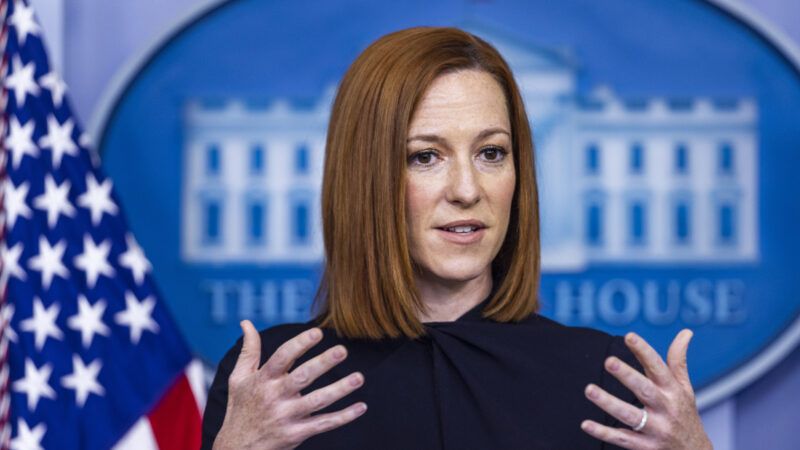The Biden Administration's Obfuscation on Using Clemency To Free Pot Prisoners Is Not a Hopeful Sign
Press Secretary Jen Psaki repeatedly tried to muddy the issue by changing the subject to reclassifying marijuana.

On 4/20 last week, White House Press Secretary Jen Psaki reiterated President Joe Biden's opposition to marijuana legalization and muddied his intentions regarding people serving time in federal prison for growing, transporting, or selling cannabis. Biden's support for maintaining the federal ban on marijuana is consistent with what he said during his presidential campaign. But his position on federal marijuana offenders is ambiguous, and Psaki only compounded the confusion by irrelevantly noting his plans to move cannabis from Schedule I of the Controlled Substances Act to Schedule II.
House Judiciary Committee Chairman Jerrold Nadler (D–N.Y.) plans to reintroduce the Marijuana Opportunity Reinvestment and Expungement (MORE) Act, which was approved by the House of Representatives in December but was never considered by the Senate. Among other things, the MORE Act would repeal the federal ban on marijuana. Senate Majority Leader Chuck Schumer (D–N.Y.) says his chamber likewise will soon consider legislation that would "end the federal prohibition on marijuana." A recent Quinnipiac University survey found that 69 percent of Americans, including 78 percent of Democrats and 62 percent of Republicans, support legalization.
But when New York Post reporter Steven Nelson asked Psaki during a press briefing last Wednesday whether Biden would sign such a bill, she reiterated his support for rescheduling (as opposed to descheduling) marijuana "so researchers can study its positive and negative impacts," for allowing medical use, for letting states legalize recreational use, and for "decriminalizing marijuana use and automatically expunging any prior criminal records." Pressed to explicitly say whether Biden would sign a bill like the MORE Act, Psaki replied, "I just have outlined what his position is, which isn't the same as what the House and Senate have proposed."
Psaki's response was consistent with the criminal justice agenda that the Biden campaign's website described last year. But during a Democratic presidential debate in November 2019, Biden went further. "I think we should decriminalize marijuana, period," he said. "And I think…anyone who has a record should be let out of jail, their records expunged, be completely zeroed out….Everybody gets out, record expunged."
Unlike the position Biden later took, those remarks did not distinguish between low-level possession, which accounts for a tiny share of federal drug cases, and manufacture or distribution, activities that still trigger harsh penalties under federal law even though 18 states have either legalized them or are moving toward doing so. As a longtime drug warrior who for decades championed draconian penalties, Biden bears personal responsibility for marijuana offenders who continue to languish in federal prison, such as Ismael Lira and Pedro Moreno, who are serving life sentences for distributing marijuana from Mexico.
"Some people in prison on marijuana charges are asking President Biden to keep his campaign promise and release them," Nelson noted at the press briefing. "Where is President Biden on keeping that campaign promise?"
Psaki's response was evasive and misleading. "Well," she said, "I think when I'm talking about rescheduling cannabis as a Schedule II drug…that is also going to have an impact on the criminal justice system."
Contrary to Psaki's implication, offenses involving Schedule II drugs such as cocaine, methamphetamine, and prescription opioids carry severe penalties. While moving marijuana to Schedule II might facilitate medical research, it would not by itself prevent federal courts from continuing to impose long sentences on marijuana offenders, and it certainly would do nothing to help current prisoners.
At another press briefing the next day, Nelson tried again. "You were asked whether President Biden will honor his Democratic primary campaign pledge to release, quote, 'everyone' in prison for marijuana," he said. "People are skeptical that he will. President Biden is personally responsible for sending some people to prison for life for marijuana under his 1994 crime bill. And Vice President Kamala Harris oversaw 1,900 marijuana convictions as San Francisco district attorney….Will President Biden honor his commitment to release everyone imprisoned for marijuana?"
Psaki did not deny that Biden had made that promise, but she brought up "rescheduling" again and claimed she did not know the answer because it depends on arcane legal knowledge. "What you're asking me is a legal question," she said. "And now we're in government, and so I had to follow up with our legal team, and I don't have any additional information quite yet….I think I've stated very clearly what the president's position is. What you're asking me is a legal question. I'd point you to the Department of Justice."
The "legal question" really is not that complicated. During his campaign, Biden said he would "broadly use his clemency power for certain non-violent and drug crimes." That promise, combined with his statement that "anyone who has a [marijuana] record should be let out of jail," created a reasonable expectation that he would use his clemency power to release prisoners like Lira and Moreno, as Donald Trump did for some marijuana offenders and Barack Obama did on a much bigger scale.
Corvain Cooper, one of the pot prisoners freed by Trump, told Nelson, "No one should be serving a long prison sentence over marijuana when states and big corporations are making billions of dollars off of this plant." Biden's commitment to "broadly use his clemency power" has nothing to do with rescheduling marijuana, and Biden could begin delivering on it today if he were so inclined. Psaki's obfuscation suggests it is not a high priority.
